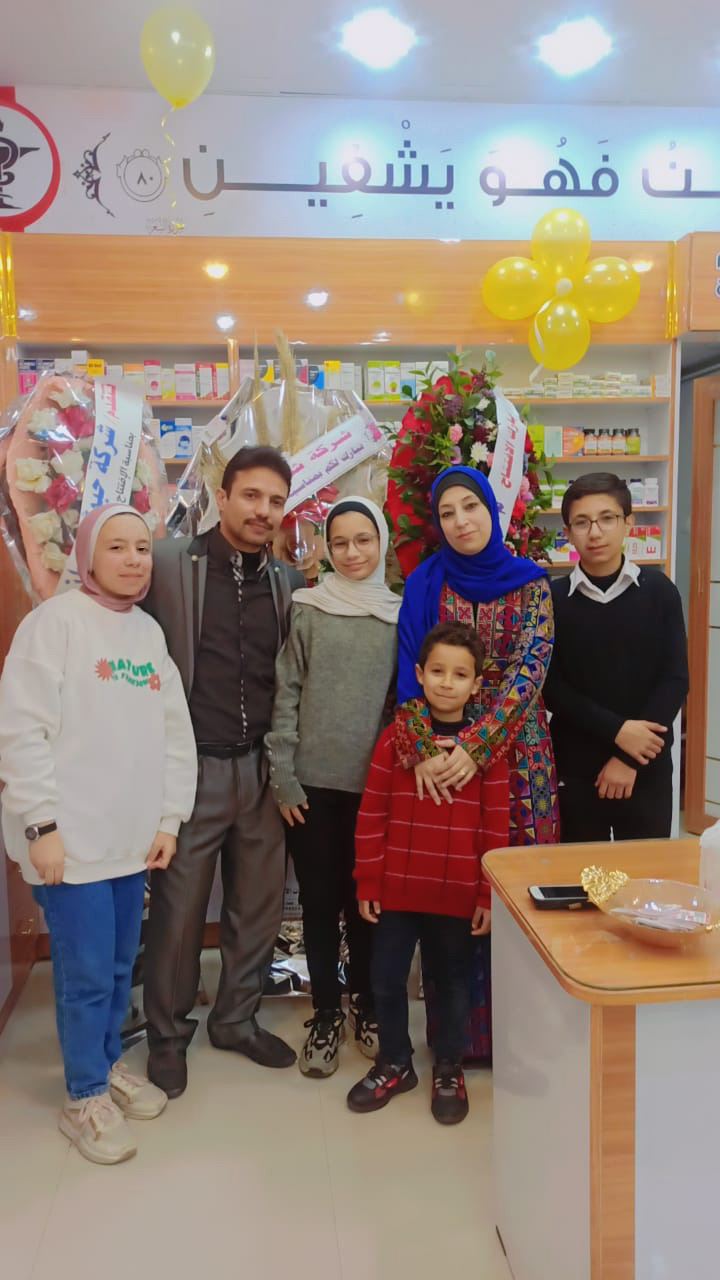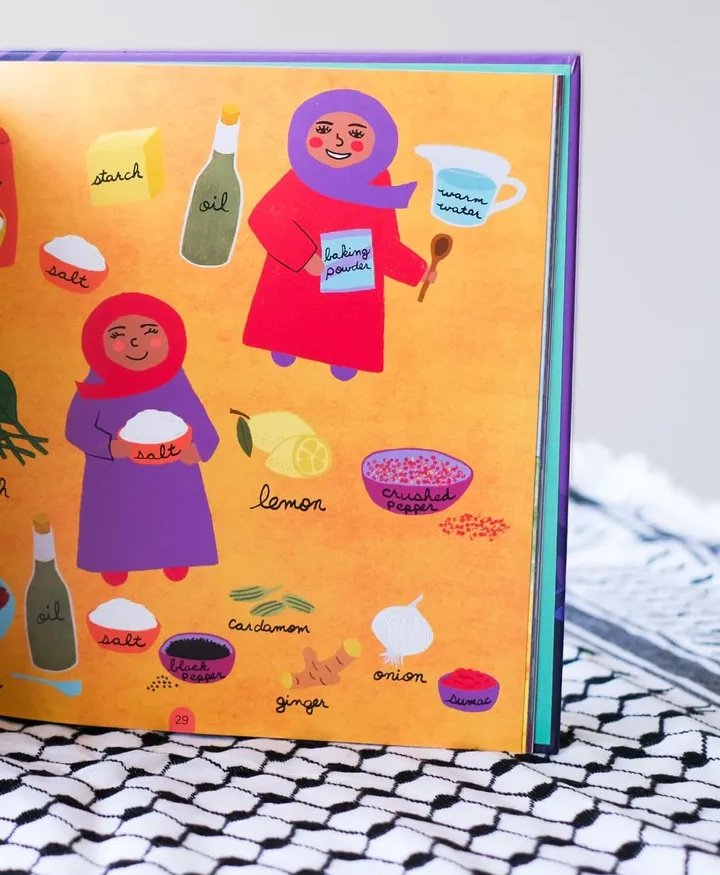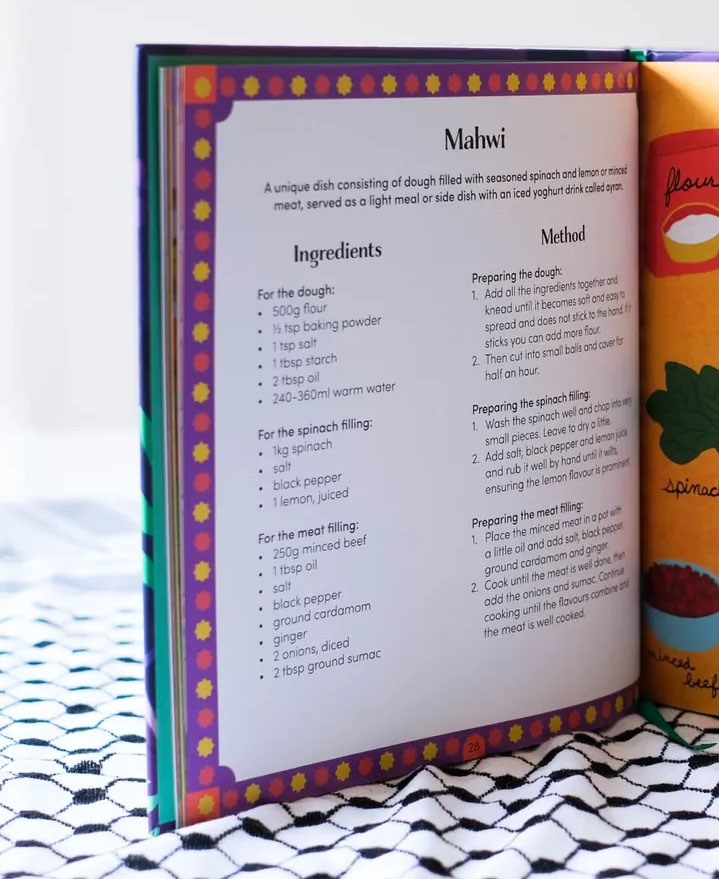Part of the Series
Struggle and Solidarity: Writing Toward Palestinian Liberation
In the heart of Gaza, during the darkest days of Israel’s 18-month genocide, Chef Mona Zahed continued to cook. At the age of 38, with four children depending on her, Zahed became a beacon of hope for her family as she navigated despair and a lack of food while continuing her culinary practice. Her passion for cooking not only fueled her survival but also culminated in the release of her cookbook, Tabkha: Recipes From Under the Rubble. The book, which showcases 20 traditional Palestinian recipes and includes innovative alternatives born from extreme hardship, is a crucial documentation of Palestinian cultural tradition amid Israel’s genocidal campaign of erasure. Published by Slingshot Books, Tabkha also features illustrations made by 21 artists.
“I’m a science graduate and a proud mother of four: Mohammad, 16, Hayat, 15, Sarah, 14, and Zahed, 10,” Zahed told Truthout. “We live in a home that’s partially fallen apart, in an area of Gaza that’s seen a lot of destruction. Many buildings are just piles of rubble, and we struggle to find basic needs like water for washing and drinking. The streets are cluttered with trash and debris, but despite it all, we’re grateful to be back in our homes and are determined to make a life here.”
The biting cold and absence of basic utilities highlight the challenges she endures. “It’s freezing here because we have no windows to block the chilly air. We cover the gaps with nylon, which doesn’t really keep us warm for our children, but at least it’s a step up from the tent we lived in while we were displaced.”
Before the genocide began, Zahed ran a teaching center and her husband managed his own pharmacy while their kids attended school. Their home shared a neighborhood with several international organizations.

“Our life before the war was beautiful, Alhamdulillah. We enjoyed everything around us and were on the verge of financial stability. I taught at the center from 8 am to 5 pm,” Zahed shared. Her commitment to her children’s education was clear: “I would take a break from 10-11 am to cook and care for them before heading back to teach.” She even brought her young child, Zahed, along with her, proudly noting, “My children are the top in their classes, Alhamdulillah. I always tried to ensure that their education remained unaffected by my work or their father’s, but when the war hit, everything changed.”
Zahed says she’ll never forget the Israeli assault’s first day. “I was getting my children ready for school for their exams, and at first, we didn’t understand what was happening; we thought it was just rain or thunder. Confusion and worry set in as I kept them indoors while we followed the news, struggling to process the shock of the unfolding chaos. Three days later, our neighborhood, known for its towers and buildings, became one of the first bombed, prompting us to evacuate as the danger drew alarmingly near to our home.”
Amid the attacks, Zahed found creative ways to deal with the scarcity in her cooking. “During the genocide, I crafted recipes from the limited resources we had due to starvation and food shortages.” Despite the dire circumstances, she worked hard to uplift her children’s spirits. “They were satisfied with what I made, even eating meals they had previously disliked because they simply had no other choice.”
“Moreover, there was no gas, which made meal preparation incredibly time-consuming; we had to cook things in advance,” Zahed explains.


“Sometimes, when we found a single apple, we felt a wave of happiness, slicing it thinly to share among four of us once a week,” Zahed said. Necessity demanded innovation in her recipes: “When yeast was unavailable, I experimented with fermenting dough. With no fresh fish around, I used canned tuna to create fesikh, sometimes frying it and other times baking it with vegetables. I transformed luncheon meat into various dishes, frying it or crafting it into shawarma, while canned beef became a savory grilled delight with parsley and onion. I even added vermicelli to our lentil soup, constantly adapting to make the most of what little we had.”
Now two months into a total blockade on all aid into Gaza, tens of thousands of Palestinian children are in urgent need of medical care due to malnutrition.
Even these meals, with their alterations borne out of need, could be logistically difficult to put together. “Most of our food consisted of canned items, which were hard to find and often too expensive,” said Zahed. “As a woman and a mother, I bore a heavy responsibility during those [first] 15 months, looking after many people. Those were tough days, especially when we ran out of flour; it broke my heart to see my children without bread. We often spent our days eating just pieces of biscuits from aid packages, only two at a time per packet.”
These extreme food shortages were not unintended by Israel, but were deliberate — “a tactic of genocide,” according to a UN report from July 2024:
Israel made its intentions to starve everyone in Gaza explicit, implemented its plans and predictably created a famine throughout Gaza. Tracking the geography of Israel’s starvation tactics alongside Israeli officials’ statements confirms its intent. Israel opened with a total siege that weakened all Palestinians in Gaza. Then, Israel used starvation to induce forcible transfer, harm and death against people in the north, pushing people into the south, only to starve, bombard and kill people in newly created refugee camps in the south.
The consequences have been devastating. “Never in post-war history had a population been made to go hungry so quickly and so completely as was the case for the 2.3 million Palestinians living in Gaza,” the report stated.
Israel has also repeatedly targeted Palestinian cooks and food aid providers, killing those who are striving to feed a starving population.
Now two months into a total blockade on all aid into Gaza, tens of thousands of Palestinian children are in urgent need of medical care due to malnutrition. Dozens of Palestinians have died have died due to Israel’s starvation policy. Amid the longest and most encompassing blockade ever imposed on the besieged territory, international food organizations in Gaza have said their supplies are gone. Nearly 290,000 children may perish soon if food is not allowed in, Al Jazeera reported.
Before conditions further plummeted, Zahed found ways to prioritize her children’s nutrition. “Sometimes, I would take the leftover white rice from lunch, add spices and seasonings so that my children would accept it for dinner.” She made use of every available ingredient: “We used dry bread in lentil soup or in salads called ‘fattoush,’” showcasing her resourcefulness in ensuring her family’s sustenance amid scarcity.
Zahed explained to Truthout how the genocide has changed her. “The war affected me a lot, but it proved to me that I’m strong. It has made me older and taught me many lessons, placing many responsibilities on my shoulders, yet we remained steadfast.” Those responsibilities came under the most harrowing of conditions. “One of the most horrifying days was the night we were forced to flee our home when they planned to bomb the tower nearby. Even when I ask my children about their most terrifying memories of the war, they also mention this night.”
“Another terrifying moment was when we fled from Deir al-Balah to Khan Younis, traversing streets filled with tanks and snipers. We truly believed that it could be our last moment. With no other choice, we pushed through, surviving by a miracle while witnessing people being injured and killed right before our eyes.”
Zahed mourned the profound loss of Gaza’s beauty due since October 7, 2023. “Just a day before the war erupted, I strolled along the beach, expressing to my brother how lovely Gaza was while yearning for job opportunities and development. Now, Gaza feels like a graveyard; returning home, I barely recognized the streets, filled with sorrow as if we had regressed a century. We hope for a day when it can be rebuilt.”
“While the world sympathizes with us, many see us merely as numbers. Our suffering, perceived as normal to some, overshadows our identities; we are not just statistics but individuals with families and friends. The ongoing violence reduces us to mere figures, yet we are people deserving of a dignified life.”
Zahed’s book highlights Palestinian cultural tradition during a time when Israeli forces are trying to erase everything about Palestinian life. It is an attempt to save this heritage and traditional food even with the absence of some basic ingredients.

Despite the horrors surrounding her, Zahed found she could engage with her children through food: “My children were confident in my cooking. When we stumbled upon ingredients for a meal we hadn’t had in a long time, their joy was palpable as they exclaimed, ‘Mom, this is the Gazan food!’ — a phrase they often repeated.” She believes that her passion for cooking reflects her people’s resilience: “All recipes reflect the strength of the Palestinian woman. The war has shown us that we can find alternatives and create something from nothing. Throughout the hardship and starvation, it became clear that Palestinians possess an incredible ability to adapt and innovate in dire circumstances.”
Amid the struggles of displacement in Nuseirat camp, Zahed recounts the daily challenges her family faced while living in temporary shelter. “Living in a sixth-floor apartment, my son Mohammed would carry 20-liter gallons of water up the stairs as we needed about 4-5 gallons daily. We cooked over an open fire, relying on basic staples like rice, spaghetti and soup, often only having bread once a day due to the high cost of vegetables.” During these hardships, her passion for cooking brought her joy: “Whenever I cook, I feel a sense of happiness. Even during the war, people would reach out for my recipes, and it fills me with pride to help others in this way. I love crafting delicious meals, often picturing the ingredients before I start cooking.”
The cookbook wasn’t just about recipes — it’s about preserving culture in the face of devastation.
Tabkha was inspired by a Japanese friend, who encouraged her to compile a diary of recipes for sale. In the book, she included 15 traditional Palestinian recipes, covering both desserts and savory dishes. In the midst of war, she took the initiative to document her culinary legacy, creating videos that showcased her improvisation with the ingredients around her. Her cookbook features a variety of dishes, including both desserts and savory meals, along with what she refers to as the “war alternatives” — all based on innovative recipes inspired by traditions passed down from her ancestors. It also showcases the work of 21 artists who illustrated the recipes, each in their unique styles.
“I loved to put that in a book because we want to reach our voice to the world. Every culture has its guide, and when food recipes spread widely, people start getting attracted to it and start to ask who created it,” Zahed said. Everything about putting the book together — from the improvisation to the ancestral knowledge to the spread of Palestinian culinary tradition — serves as an act of resistance during genocide, as the Israeli state attempts to erase Palestinian existence.
The cookbook wasn’t just about recipes — it’s about preserving culture in the face of devastation. “Our recipes tell the world stories of our history, cause and that we exist. Maqlouba, Maftool, and Sumaqiyaa are all dishes that represent our people. Each time Palestinian food becomes a trend online and I see people from all over the world making it, I feel proud that the world knows Gaza and that we are not forgotten,” Zahed said.
Through creative improvisation, inherited knowledge, and the richness of Palestinian food, the book documents life, love and identity as Israel attempts to destroy and starve Gaza.

Zahed expressed a strong desire to restart her culinary explorations. “I want to work again on my cooking project, but gas is expensive, and other materials are hard to find.” Still, Zahed envisions a future where she has her own business — a shop to share her food, and a kitchen specifically for women.
“My message to the world is that Palestinians in Gaza are humans who feel and have dreams,” Zahed said. “We deserve to live peacefully. We will start again. We are strong people who don’t lose faith. We have hope.”




Help Truthout resist the new McCarthyism
The Trump administration is cracking down on political dissent. Under pressure from an array of McCarthy-style tactics, academics, activists and nonprofits face significant threats for speaking out or organizing in resistance.
Truthout is appealing for your support to weather this storm of censorship. We’ve launched a fundraising campaign to find 362 new monthly donors in the next 5 days. Will you be one?
As independent media with no corporate backing or billionaire ownership, Truthout is uniquely able to push back against the right-wing narrative and expose the shocking extent of political repression under the new McCarthyism. We’re committed to doing this work, but we’re also deeply vulnerable to Trump’s attacks.
Your support during our fundraiser (5 days left) will help us continue our nonprofit movement journalism in the face of right-wing authoritarianism. Please make a tax-deductible donation today.
